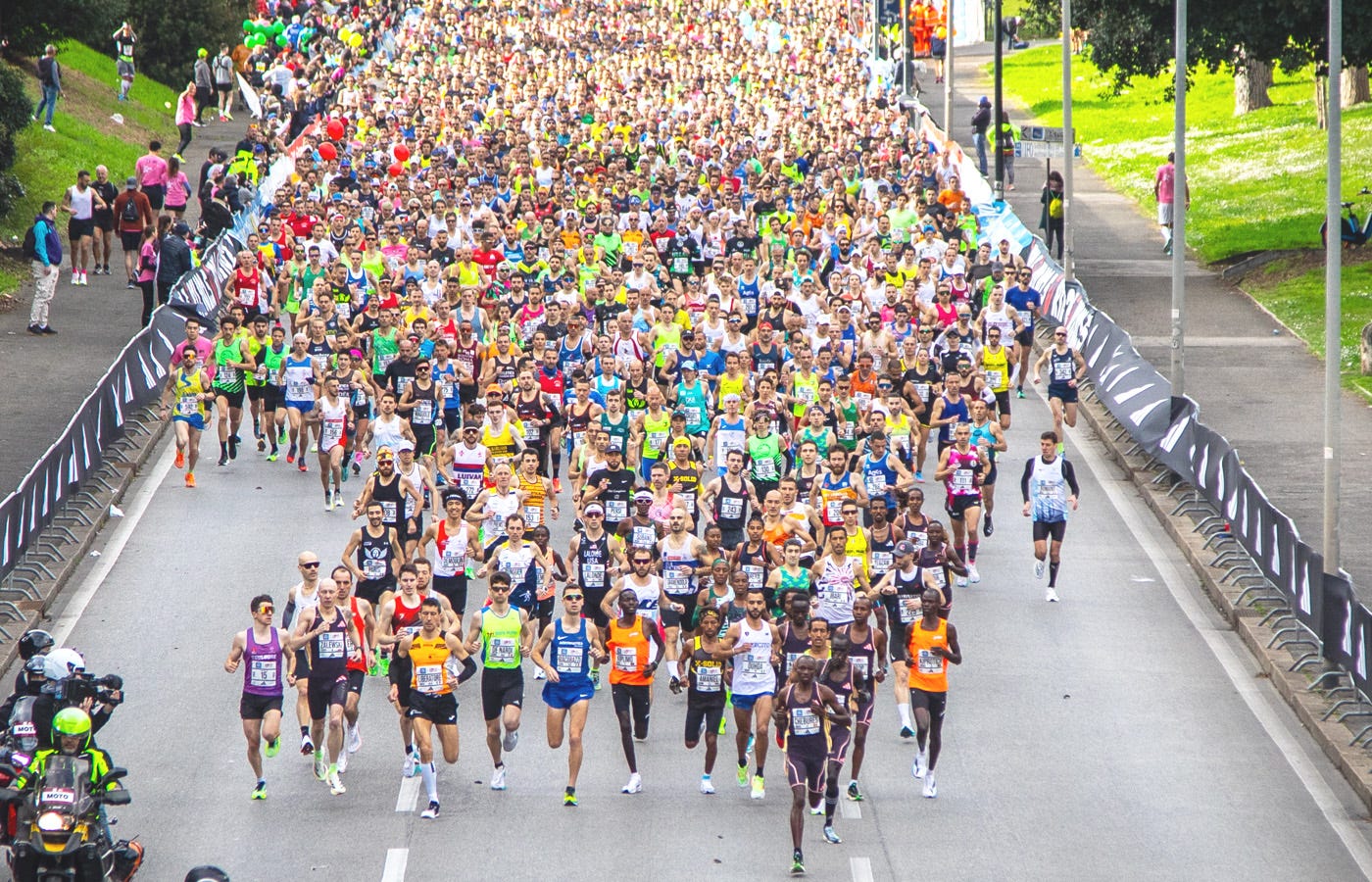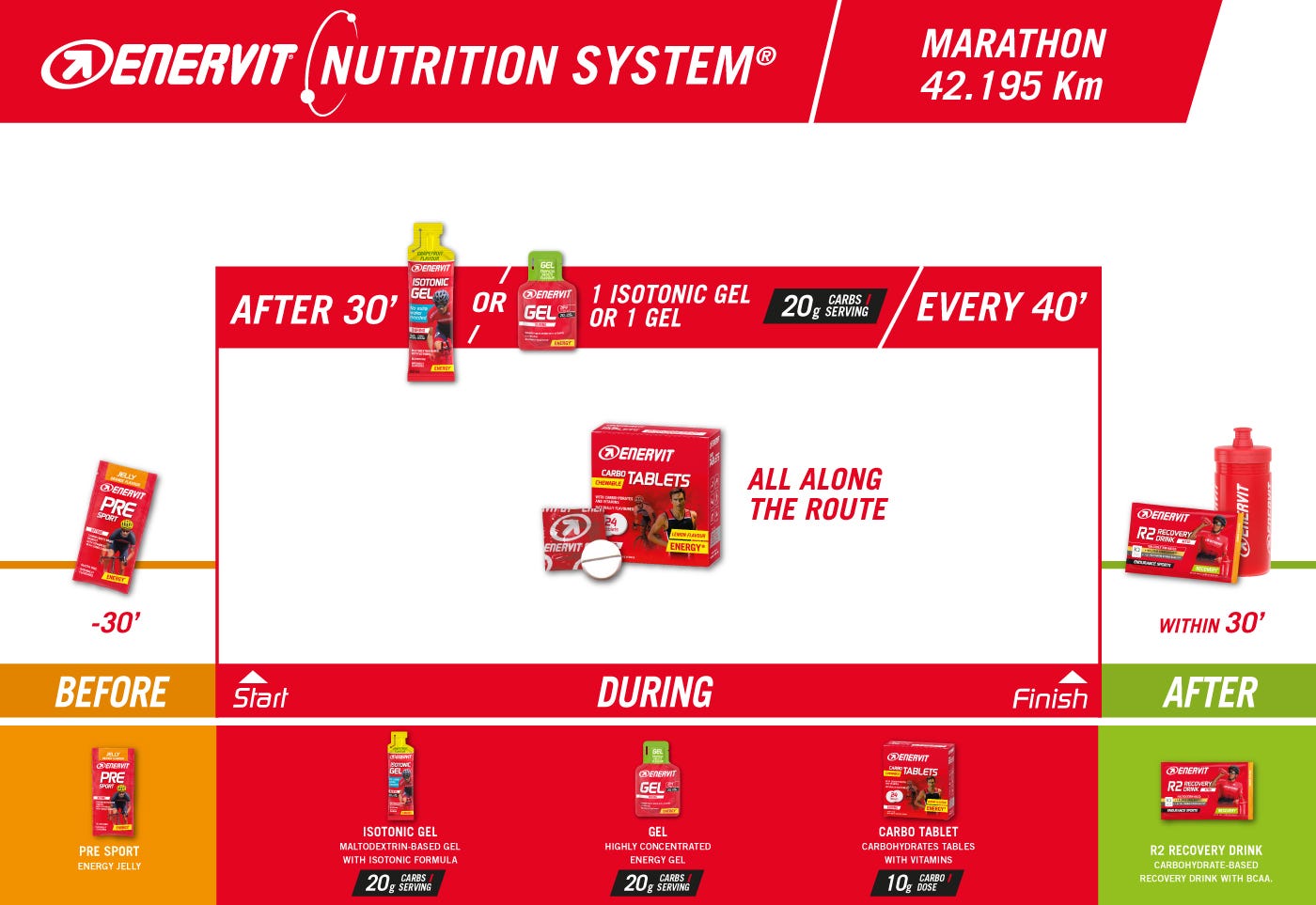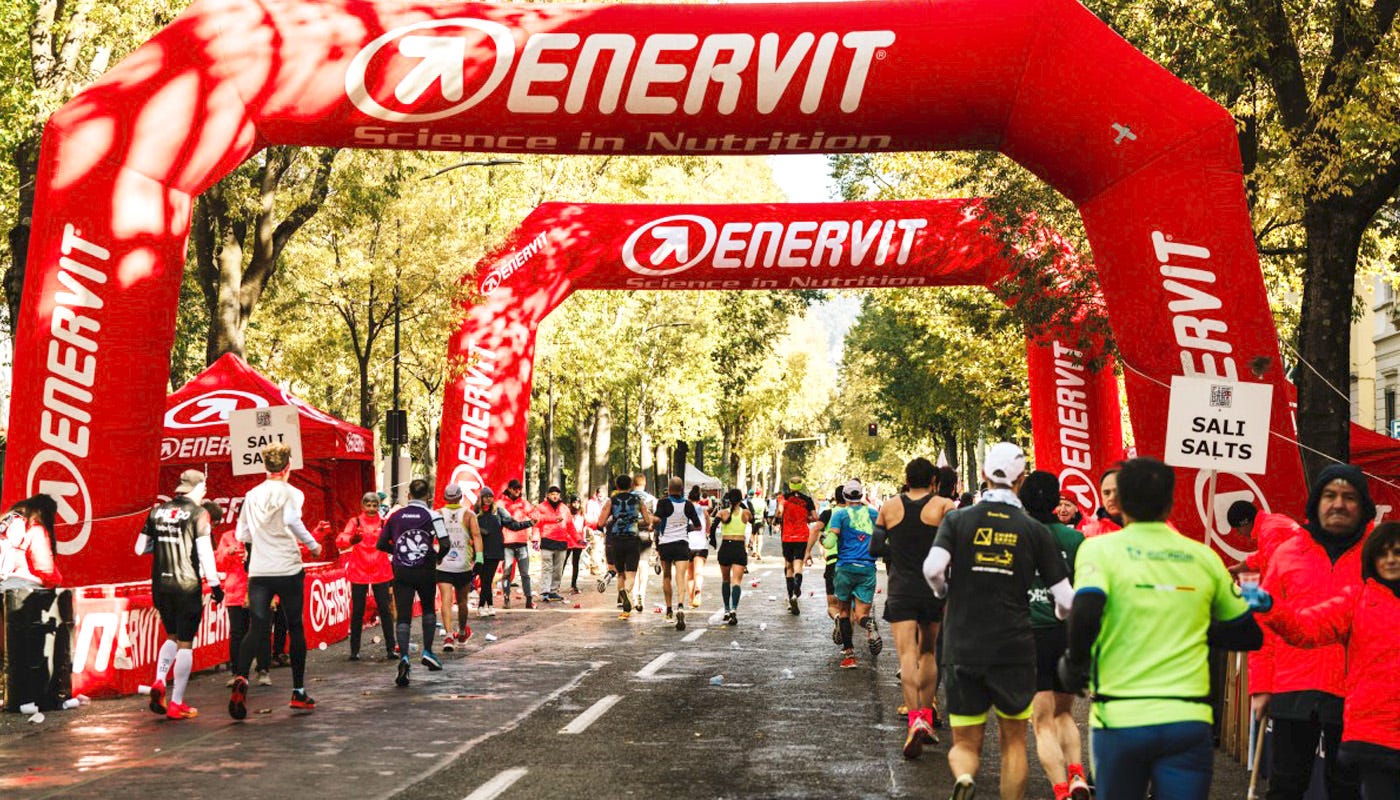Seven days out from your marathon
by Equipe Enervit
42 kilometers and 195 meters: the iconic race of the ancient Olympic games. A marathon is not an impossible feat, but it requires great endurance both physically and mentally. If in the last week before the race the athletic preparation must already be at its peak, it is from the nutritional point of view that every choice can become fundamental to aim for an optimal performance.

The last week: nutritional guidelines
To face a long-lasting physical effort, it is important to ensure sufficient energy reserves, especially in terms of carbohydrates. They are the main source of energy for high-intensity activities, as they represent the most immediate source compared to fats. For this reason, during a marathon performed at a "good pace," the body primarily draws energy from glycogen, the carbohydrate "reserve" stored in the muscles and liver.
The "carbo loading"
To allow our body to accumulate significant amounts of glycogen, it is essential to follow a carbohydrate-rich diet for several days. Loading up excessively the day before or even on the morning of the race could be counterproductive. Instead, let's carefully plan the diet starting from 5-7 days before the event.
In the past, the so-called "carb depletion and loading" strategy was often employed: during the first part of the last week, it was customary to minimize carbohydrate intake, and then dramatically increase consumption in the last 2-3 days.
Today, we know that this practice has several limitations, particularly:
- It doesn't allow us to perform finishing workouts with sufficient energy in the first part of the last week
- It can excessively stress the gastrointestinal system
How to properly execute carbohydrate loading
In the week leading up to a marathon, the main advice is to decrease training load: reducing training hours, combined with a proper intake of carbohydrates, will be more than sufficient to accumulate good muscle glycogen reserves.
In practice, we should maintain the same carbohydrate intake that we consumed on days when we performed the longest and most intense workouts during preparation. By lowering workloads, we effectively create a physiological surplus without overburdening ourselves.
In the last seven days, we suggest a carbohydrate intake ranging between 5 and 7 grams of net carbohydrates per kilogram of body weight. If intense workouts are still planned during the last week (some athletes perform workouts with sprints until the final days), it would be advisable to aim for the higher end of the suggested range.
We should also pay attention to immediate post-workout nutrition: the advice is to consume specially formulated products containing carbohydrates with amino-acids within the first 30 minutes after the end of the activity.
What about proteins?
Proteins are an essential macronutrient, and we cannot overlook them. The advice for the last week is to maintain the standard protein intake, which is the amount consumed during the season. Careful selection of protein sources can be the "winning strategy": in the initial phase of the pre-race week, we can include more "fatty" sources (such as salmon or mackerel), while in the last days, and especially in the pre-race dinner, it's better to prioritize lean proteins (such as chicken or turkey).
In addition to this, we can consider the option of replacing part of the daily protein intake with the supplementation of essential amino-acids.
The day before
The last day is generally dedicated to rest, or at least does not involve any significant training. Therefore, 5-7 grams of carbohydrates per kilogram of body weight will likely be sufficient for most athletes.
The mistake to avoid is disrupting one's own habits: this is not the time to experiment, especially regarding the foods we consume. Some athletes end up doing so to emulate their "expert" friend. Nothing could be more wrong, just like running a marathon with a pair of brand-new shoes straight out of the box! So, let's stick to the same carbohydrate sources that we have consumed during the weeks of preparation, which likely are the ones that have allowed us to arrive in good shape for the marathon.
Pre-marathon breakfast
A good breakfast is crucial as it provides the necessary fuel to start our race on the right foot. In this case, the rule from the previous day applies, meaning no experimentation or changes in habits. Therefore, let's stick to the same breakfast that we have consumed before our long runs during the preparation season. To try to reach the optimal carbohydrate intake, we can consider introducing a "pre-race snack." This is a snack consumed about 45-60 minutes before the start of the event. In this case, the advice is to consume technical carbohydrates with prolonged energy release, such as Isomaltulose.
And hydration?
Staying hydrated during the race can be challenging. To delay the negative effects of dehydration, it's crucial to start well-hydrated. Before the race, we recommend increasing water intake, while also not forgetting electrolytes such as sodium, chloride, and potassium. Only by maintaining adequate electrolyte balance we can effectively retain the water we consume. Using isotonic drinks is also advisable the morning of the race because, in addition to hydrating us, they also provide a good amount of carbohydrates without weighing us down.
Energy strategy during the race
For long events like a marathon, we can establish a standard intake of approximately 30 grams of carbohydrates per hour of racing, which equates to consuming an energy gel every 40 minutes. This amount will be sufficient for both more experienced athletes - with a race time of about 3 hours or less - and for more amatorial runners: increasing the time to finish the race, it also increases the carbohydrates intake.
Never forget that we should always try the nutrition strategy during the long training sessions, well before the last week.

Post-Race Recovery
A marathon is an event that impacts every aspect of the body. Recovery is crucial: we can say it's the first step towards the next training session or race.
As soon as we cross the finish line (within the first 30 minutes), we recommend consuming high-glycemic index carbohydrates (1-1.5 g per kilogram of body weight) combined with 20-30 grams of high-quality protein.
The combination of maltodextrins and whey protein represents an optimal mix to start recovery, before indulging in a well-deserved post-race meal.
To summarize:
|
Bibliography
- Burke LM, Cox GR, Culmmings NK, Desbrow B. Guidelines for daily carbohydrate intake: do athletes achieve them? Sports Med. 2001;31(4):267-99. doi: 10.2165/00007256-200131040-00003. PMID: 11310548.
- Smith, A.M., & Collene, A.L. 2015. Wardlaw's Contemporary Nutrition (10th ed.). New York: Morgan-Hill.
- Thomas DT, Erdman KA, Burke LM. Position of the Academy of Nutrition and Dietetics, Dietitians of Canada, and the American College of Sports Medicine: Nutrition and Athletic Performance. J Acad Nutr Diet. 2016;116(3):501–28.
- Rosenbloom, C., & Coleman, E. 2012. Sports Nutrition: A Practice Manual for Professionals (5th ed.). Chicago: American Dietetic Association.





